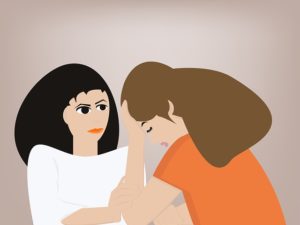
We all have personal rules and beliefs about how the world works. They shape how we think about ourselves, other people, and our purpose in the world.
Rules tend to take the form of “If ……,then…….”. For example, “If I fail this exam, then it means I am an idiot”.
Beliefs tend to take the form “I am….” or “You are……” or “The world is………..”. For example, “I am not lovable” or “People are untrustworthy”.
Our personal rules and beliefs develop as a result of our brain attempting to make sense of all our past and present experiences.
Some of our strongest personal rules and beliefs develop during ‘key developmental periods’ in our life, when our brains are reorganising rapidly in order to help us interact in the world. These periods include early childhood (e.g. 0-5) and adolescence/young adulthood (12-25).
Not all the personal rules and beliefs that we hold are accurate or helpful. In fact, I can guarantee that you (and I) both have some personal rules/beliefs that aren’t doing us any favours. As an example, in the aftermath of a failed relationship, we probably carry with us (at least for a while) some exaggerated beliefs about the trustworthiness of others or our own personal self-worth.
Inaccurate beliefs and rules arise because our experiences of people and the world during key developmental periods are sometimes not the same as what our experiences of people and the world are going to be as adults.
Take for example, the young man who gets bullied at school and who comes to believe that a) he is ugly and unlikeable and b) people are untrustworthy. These beliefs made some logical sense at the time because of his experiences of teasing and rejection, but in adulthood (now the young man is both attractive and likeable) these beliefs would act only to make him awkward in establishing close relationships and wary of the intentions of others.
What are the signs that I might hold some unhelpful or inaccurate beliefs/rules?
If you are ‘stuck’ in some way, it might indicate the presence of unhelpful or inaccurate rules/beliefs. Being ‘stuck’ can present in a number of ways:
- Regularly experiencing strong unpleasant emotions that you are struggling to manage.
- Regularly engaging in behaviours that are harmful to you, or your likelihood of moving forward.
- Feeling ‘stuck’, like you can’t quite move forward in life.
- Not feeling like you are coping with the challenges of life.
- Multiple people indicating that you are wrong about a particular issue.
I want to make it clear though that these experiences are not definite indicators of unhelpful or inaccurate underlying beliefs. It might be that you are simply in a difficult situation, or that the unhelpful beliefs reside in other people who are causing you trouble. They are however experiences where it is worth considering the possibility that your personal rules/beliefs might be acting against your best interests.
It is also worth noting that the personal rules and beliefs that typically cause us the most trouble are also often the most difficult ones to identify and change. That is because we hold these rules and beliefs to be ‘absolutely true’ and are very resistant to entertaining alternative possibilities.

How do I identify the personal rules and beliefs that might be holding me back?
Our personal rules and beliefs don’t always broadcast themselves in really obvious ways. It would be great if we could just print off our rules, straight from our brain, but unfortunately it isn’t quite that easy.
Instead you have to learn to listen to the different ways that your rules and beliefs reveal themselves.
1. Your rules/beliefs influence the way you talk about yourself, others, the world and the future. Spend time talking with close friends and family about the things you find most difficult. When speaking with people we trust, we express in more detail how we understand the world and our place in it. If we listen closely to ourselves in these situations, we’ll get some clues as to our underlying beliefs. Sometimes the person we are talking to might identify them for us.
2. They influence the way you think about yourself, others, the world and the future. Monitor your thoughts during periods of distress or uncertainty. A good way to do this is through keeping a journal. A journal is a way to capture the content of the constant chatter that is going on in your head. When you read it back, you can start deducing your rules and beliefs. For example, if you read your journal and see lots of comments about the frustrating behaviours of other people in your life, it might point to some underlying beliefs you have about your happiness being dependent on the behaviour of other people.
3. They influence the way you behave on a daily basis. Reflect on how well you look after yourself on a daily basis (e.g. sleep, diet, physical activity, pleasurable activities, hygiene). A lack of desire for self-care might point to beliefs you hold about your self-worth, or how deserving you are of love and care. Equally, they might point to beliefs about invulnerability and imperviousness to damage.
4. They shape your preferences and how you react in different situations – Notice the people and situations that elicit a strong reaction in you. Quiz yourself on why that might be the case. I once had someone in my life that elicited a lot of anger in me. On reflection I realised that I didn’t express my views in their presence because I didn’t want conflict. Underpinning that was a belief that ‘conflict and disagreement are bad and should be avoided at all costs’. That belief was playing out in many areas of my life.
5. They shape how other people respond to us – I’ve a close friend who is very attuned to when I am operating from a place of faulty or irrational thinking. Whilst I don’t always appreciate it being pointed out, they are often very accurate. Are people telling you that you are looking at a situation the wrong way? Perhaps there is some truth to what they are saying. Perhaps they’ve identified some faulty thinking on your part.
In addition to paying attention to how you talk, think, behave and choose, the other big way to better understand your personal rules and beliefs is to be an avid reader and learner. I strongly encourage anyone who feels stuck in their life to read books about human nature and behaviour. There are literally hundreds of thousands of books you could start with. Here is as good a starting point as any – https://www.mindovermood.com/
Consider also meditation. In mindfulness meditation specifically, you practice the art of noticing the rise and disappearance of different thoughts, feelings, sensations and beliefs. Many people come to better understand their internal world in the process. Start with an app (e.g. Smiling Mind – https://www.smilingmind.com.au/).

What do I do if I think I have identified some unhelpful personal rules and assumptions?
If you think you have identified some personal rules and assumptions that are holding you back (some people call them limiting beliefs), then you are already well down the path of addressing them. Even admitting to the possibility that your beliefs are holding you back is a big step. Take a moment to be compassionate towards yourself for being open enough to entertaining the idea. Compassion means acknowledging that it is totally normal to hold self-defeating beliefs and reminding yourself that you are capable of addressing them.
If you want to take a more active role in tackling unhelpful personal rules and assumptions, consider the following:
∇ Get into the habit of noticing and naming when you think a self-defeating rule or belief is active. For example, every time I get road rage because of the driving behaviour of others, I remind myself that my belief that ‘everyone is just selfishly out for themselves’ is a gross exaggeration and not actually an accurate assessment of people’s motives.
∇ Familiarise yourself with the many ways that our thinking is not rational – https://en.wikipedia.org/wiki/List_of_cognitive_biases
∇ Construct ways to test your belief. In psychology we call these ‘behavioural experiments’. For example, if you believe that ‘I do better assignments when I do them at the last minute’ (some students think the adrenaline improves their performance), then set up a situation where you compare doing an assignment at the last minute vs one you start earlier. See if there is a difference in the grades you get.
∇ Do the opposite behaviour of the belief. This is a little bit like the behavioural experiment described above. The idea is to act contrary to the belief to see if what you think will happen, does happen. For example, if you believe “this course sucks and I hate it”, work hard to try and find something that you like about the course.
∇ Try identifying how your rule/belief might be inaccurate. Does it match any of these common thinking errors? – https://psychcentral.com/lib/15-common-cognitive-distortions/
∇ Try constructing an alternative rule/belief that is a better description of reality. For example you could modify the “people are untrustworthy” belief into something more nuanced like “sometimes people can let you down, but there are good people around who are worth knowing”.
∇ Try using some ‘tricks of the mind’ to reduce the impact of the rule/belief on how you feel and act. One of these tricks is called ‘Defusion’. Defusion involves using some of the quirks of language to reduce the impact of a belief. Say you have the belief “I am broken” which causes you a lot of distress. To defuse that belief:
⊕ Observe, notice and name. Instead of repeating the belief to yourself, modify it to “I’m having the thought that I am broken”. This little language hack provides some emotional distance from the belief.
⊕ Sound it out very slowly or repeat as many times out loud as possible until it starts to lose its power.
⊕ Sing it out to a well know tune (e.g. Happy Birthday).
⊕ Say it repeatedly in a funny voice (e.g. Daffy Duck).
⊕ Remind yourself that your mind is not always your friend
⊕ Attach the belief to some kind of visual metaphor (e.g. leaves on a stream, clouds in the sky, birds flying past). Imagine the thought coming and then leaving.
Whatever methods you use, the fundamental thing is to subject the rule/belief to additional scrutiny and attempt to keep an open mind to the possibility that the rule/belief is not a helpful one.
I commonly find that the most unhelpful rules/ beliefs are overly simplistic, rather than completely wrong. For example, the belief that ‘the world is not a safe place’ is a gross oversimplification of the nature of the dangers in life. The truth is far more nuanced. There are dangers, but we live in a world that is the safest it has ever been. Also, there are just as many (if not more) examples of people looking after each other, than people being unkind or cruel.
The takeaway message is that the personal rules/beliefs that are holding you back are probably doing so, by failing to give you an accurate reflection of how the world really works. Your goal is to update those rules and beliefs so that they help you interact with the world more effectively. Think of it like updating the software in your brain. All software needs updating, including the software that runs you.

Remember that therapy and counselling are always options
I’ll be honest. Doing this kind of work on your own beliefs can be challenging. That is why counselling and therapy can sometimes be appropriate.
One of the ways that therapy and counselling work is by having a trained individual observe and listen to your life story and posit possible rules/beliefs that might be causing difficult situations and then supporting you to implement some of the strategies outlined above.
If this sounds interesting to you, then you are probably looking for a counsellor/therapist who practises cognitive therapy, or cognitive behavioural therapy (CT, CBT). Other similar types of therapy include Acceptance and Commitment Therapy and Schema Therapy.
Speak to a GP or counsellor (http://flinders.edu.au/current-students/healthandcounselling) or visit https://thiswayup.org.au/how-we-can-help/cognitive-behavioural-therapy/ if you want to know more.

